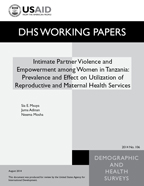- PUBLICATIONS
- JOURNAL ARTICLES
- ACCESS PUBLICATIONS
Publications Summary
- Document Type
- Working Papers
- Publication Topic(s)
- Domestic Violence, Gender, Maternal Health
- Country(s)
- Tanzania
- Language
- English
- Recommended Citation
- Msuya, Sia E., Juma Adinan, and Neema Mosha. 2014. Intimate Partner Violence and Empowerment among Women in Tanzania: Prevalence and Effects on Utilization of Reproductive and Maternal Health Services. DHS Working Papers No. 106. Rockville, Maryland, USA: ICF International.
- Download Citation
- RIS format / Text format / Endnote format
- Publication Date
- September 2014
- Publication ID
- WP106
Download
 Intimate Partner Violence and Empowerment among Women in Tanzania: Prevalence and Effects on Utilization of Reproductive and Maternal Health Services (PDF, 550K)
Intimate Partner Violence and Empowerment among Women in Tanzania: Prevalence and Effects on Utilization of Reproductive and Maternal Health Services (PDF, 550K)
